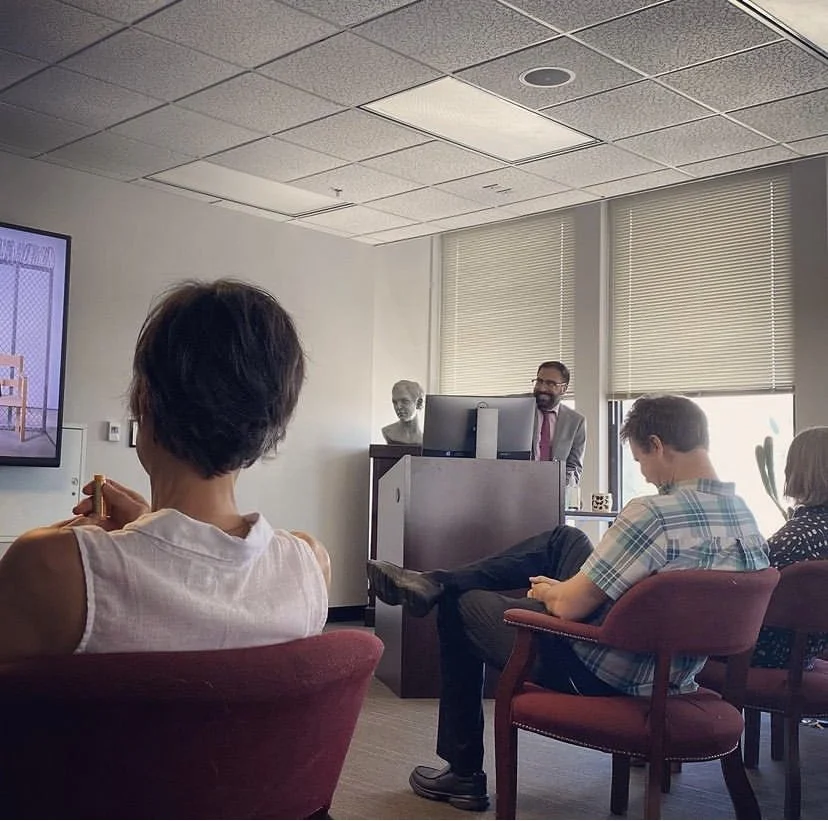
Scholarship
Research
Terrorized Intimacies: Domestic Denial and the Politics of Home in Post-9/11 Literature examines how September 11th and the War on Terror influence family dynamics. I show how violence from imperialism, racist sociolegal policies, and police brutality infiltrate intimate spheres, often deterritorializing its residents and rendering them homeless or bereft of family. Terrorized Intimacies also explores opposition to these forms of violence through spatial resistance queer kinship. While scholarship about the post-9/11 era largely emphasizes geopolitical concerns, my research investigates how the rhetorics of terror and the aesthetics of political violence resonate in the domestic arenas that comprise our every day lives.
Nearly every subfield of literary studies has engaged with kinship in some capacity, and my book takes advantage of that rich scholarship by engaging with a multitude of methodologies and theories to investigate the relationship between the Age of Terror and family: queer theory, terrorism studies, and genre studies. My work centers writers of color to rewrite the historical and literary narratives that suggest 9/11 and the War on Terror affront whiteness, when in fact the material ramifications of these political events disproportionately affect people of color. These authors include Kamila Shamsie, H.M. Naqvi, Laila Halaby, Divya Victor, N.K. Jemisin, among others. I was awarded the 2021 Mildred Kates Dissertation Fellowship from the University of North Carolina, Greensboro, for the dissertation version of this project.
My other research interests lie in millennial fiction, material culture studies, Bollywood, and Shakespeare adaptations. My work can be found in or is forthcoming from Studies in American Fiction, Multi-Ethnic Literatures of the U.S., Texas Studies in Literature and Language, Post45 Contemporaries, CEA Critic, ASAP/J, and elsewhere.
Public Scholarship & Presentations
-

Vanderpump Rules! An Avidly Cluster
My friend Olivia Stowell and I co-edited and contributed to a cluster on Vanderpump Rules for Avidly, a channel of the Los Angeles Review of Books. The pieces analyze the reality tv show through various lenses. You can read my essay, “These Are the Worst Days of Our Lives,” and the others here.
-

Post45 Contemporaries
I edited a cluster of papers on the 20th anniversary of 9/11 and the War on Terror for Post45 Contemporaries. This collection of essays considers the legacy of the attacks and the war two decades later and calls for a reframing of the narrative surround the Age of Terror—a reframing that situates 9/11 within a history of imperialism. You can read my pieces and the other contributing pieces here.
-

Selected Research Talks and Presentations
“Queer Desi Self-Fashioning: All This Could Be Different,” Association of Asian American Studies, Seattle, April 2024.
“Teaching the War on Terror in Today’s Classrooms: Challenges and Practices,” Middle Eastern Studies Pedagogy Initiative, virtual roundtable, February 2024.
“Desi Refusal: Novels and Growing Up Brown in the Age of Terror,” Modern Language Association, Philadelphia, January 2023.
“Kinship and Identity in Queer Desi Millennial Fiction,” American Studies Association, Montreal, November 2023.
“Unmaking Narratives of White Victimhood: Teaching 9/11 to a Post-9/11 Generation,” Middle Eastern Studies Association, Montreal, November 2023.
“Domestic Denial: At Home in the Shadow of No Towers,” Association for the Study of Arts of the Present, Seattle, October 2023.
“Islamophobia and the 9/11 Novel’s Archive,” Society for Novel Studies, Madison, May 2023.
“Edges of Home: the Politics and Poetics of Racialized Domesticity,” Association of the Study of the Arts of the Present, Los Angeles, September 2022.
“N.K. Jemisin’s The City We Became and the Tangential 9/11 Novel,” MELUS, New Orleans, March 2022.
“Home Runs and Blackouts: Spectacles in Don DeLillo’s Underworld and The Silence,” Modern Language Association, Washington, DC, January 2022.
“It Made Me Feel Like I Was There,” Association for the Study of Arts of the Present, virtual conference, October 2021.
“‘The Spider and Its Shadow’: Family and the Definition of Terrorism in Kamila Shamsie’s Burnt Shadows,” American Studies Association, virtual panel, October 2021.
“‘One’s Relationship to Windows’: Egresses in Mohsin Hamid’s Border(less) Exit West,” MELUS, virtual conference, April 2021.
“The Language of Gesture: Dance as Resistance in Salman Rushdie’s Haroun and the Sea of Stories”, Modern Language Association, virtual conference, January 2021.
-
Invited Talks
“Book Launch”- Invited guest participant for the launch of Jesmyn Ward: New Critical Essays, the first book-length work on Ward’s work and to which I contributed a chapter, at the University of Edinburgh, Napier. Fall 2023.
“Here, There, and Everywhere: Domestic Denial in Kamila Shamsie’s Burnt Shadows”- Inaugural speaker for the Georgia State University Department of English’s Fall Alumni & Faculty Lecture. Fall 2023.
“UNCG Alumni Job Market Panel”- Invited guest participant for a job market panel hosted by Dr. Heather Adams. Summer 2023.
“Periodization and the Age of Terror”- Invited guest lecture for graduate seminar taught by Dr. Erik Wade at the University of Bonn. Summer 2022.
“On Writing Groups”- Invited guest lecture for graduate seminar taught by Dr. Heather Adams and Dr. Jennifer Feather at the University of North Carolina, Greensboro. Summer 2021.
-

Podcasts Appearances
High Theory- The kind scholars at High Theory podcast invited me to chat about my research. We get into the 9/11 family novel, why it matters, and how it may or may not save the world. You can listen to it here or here.
PhD Pending - I sat down with Anne Mahler, Ailbhe McDaid (University College Cork), and Louise Benson-James (Ghent University) to chat about everything post-PhD. I discussed my experiences on the academic job market. You can listen to it here.
